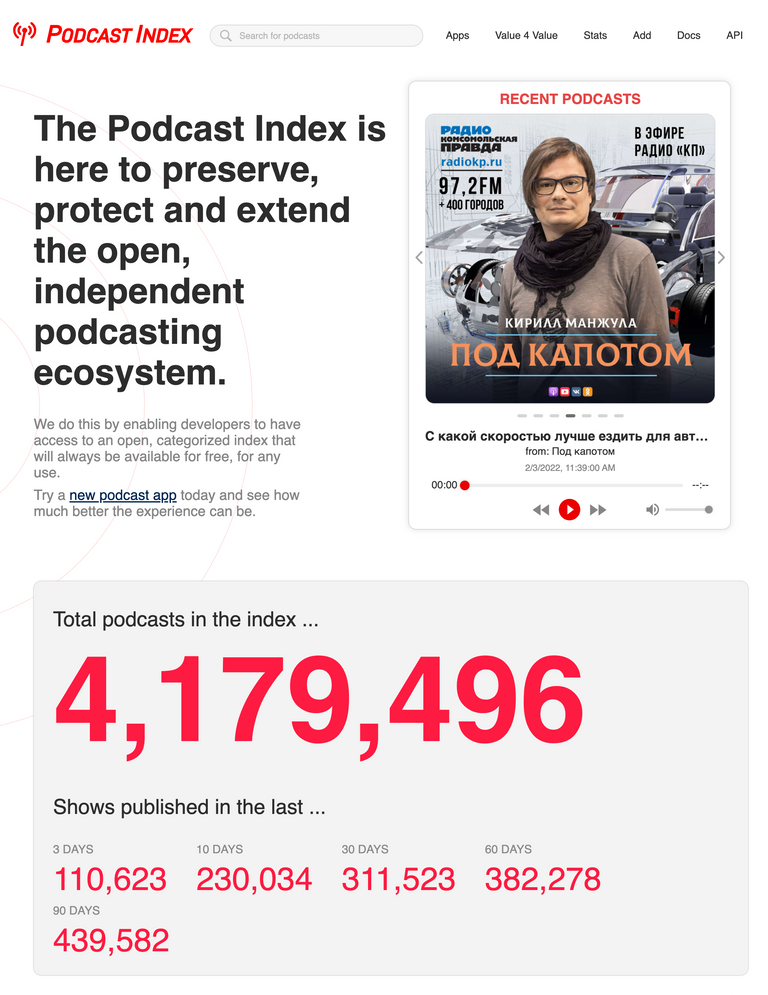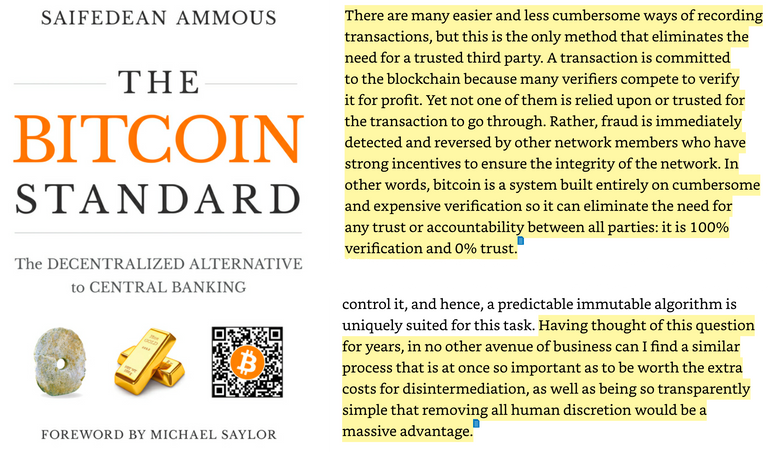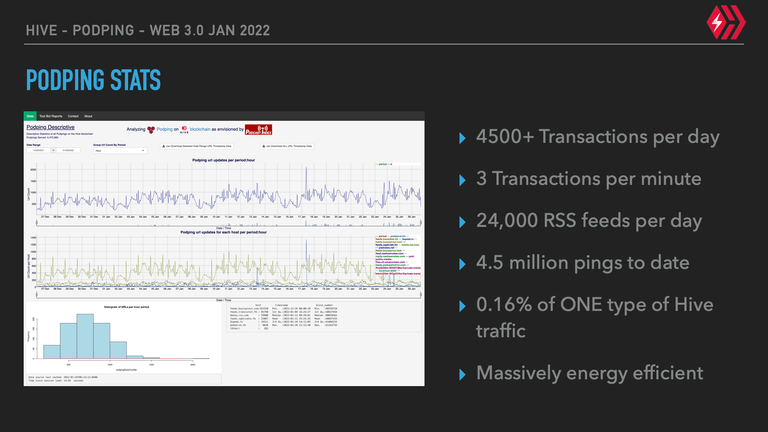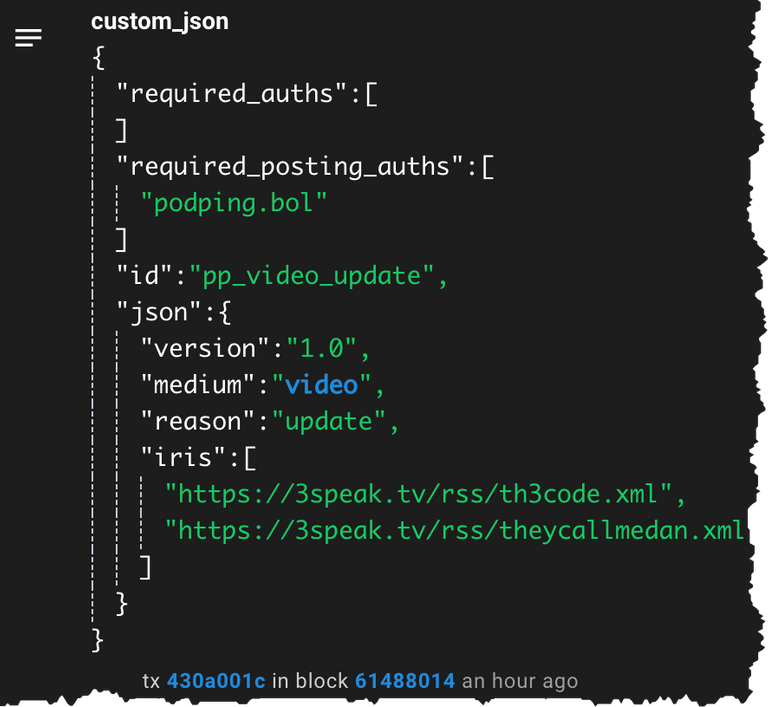TL;DR
- Podping on Hive represents the first way to send a short message to the entire world without relying on any single piece of infrastructure run by a single entity;
- Podping might be one of very few non finance related uses of an internet wide open blockchain;
- Despite many people telling us how we could do Podping with more conventional internet technologies, nobody has shown how;
- The financial incentives which make Hive viable for @splinterlands, @peakd, @threespeak and all the other real businesses being built here, make this use possible;
- Each new, individual use case of Hive's text/data handling ability (of which social media and gaming are the core functions) strengthens the entire system. It is anti-fragile.
Am I wrong about any of those points? Especially the first one? Please tell me in the comments!
I keep asking myself the same question. A couple of times over the last few weeks, @adamcurry has praised the first real project I helped build on Hive and for which there was a very significant DHF contribution. @podping allows a podcast host to send a notifications via Hive every time a podcast is updated. Listen here: Podcasting 2.0 ep69 and Podcasting 2.0 ep71.
Adam is pretty much a Bitcoin Maximalist and praise from him I take very seriously. My earlier comments on Moxie Marlinspike's work are worth reviewing too.
The Bitcoin Standard
I've been reading the Bitcoin Standard by Saifedean Ammous. This 2018 book has turned into a bit of a required text since being cited by Michael Saylor and others. It presents an excellent view of Bitcoin's place as the newest form of "hard money", the first truly global challenger to gold as a new form of hard money.
However, the book is very dismissive of all things cryptocurrency and blockchain related which are not Bitcoin. This quote captures the essence but there are pages and pages more of this:
There is nothing about bitcoin's design that suggests it would be good for any of the multitude of use cases that other coins claim they will be able to do, and no coin other than bitcoin has delivered any differentiating capabilities or features which bitcoin does not have. Yet they all have a freely trading currency which is somehow essential for their complex system for performing some online applications.
Altcoins, Page 256
However, because the rest of the book, especially its early descriptions of monetary policy and in particular the utter demolition of all things to do with John Maynard Keynes and Keynesian economics, is so good, I take it very seriously from the point of view of what I'm trying to do on Hive with both @v4vapp and @podping.

The problem with "blockchain"
"Blockchain technology", to the extent that such a thing exists, is not an efficient or cheap or fast way of transacting online. It is actually immensely inefficient and slow compared to centralized solutions.
That's the central charge and it is 100% right. This applies to Podping and all of the @v4vapp ideas we're pursuing in Podcasting 2.0.
It would be more efficient to set up a central server (with 2 or 3 or 4 backup servers) and do Podping. This was what Dave Jones at @podcastindexorg proposed: he called this idea "Hydra" because he knew it would be a many headed monster. He also knew it would take a ton of work to build the software for the servers, the clients and then set up and maintain multiple redundant servers just to pass around update notifications for podcasting.
Under the umbrella of Podcasting 2.0 and PodcastIndex's value for value fund raising model, I would trust their system, whilst Dave Jones and Adam Curry are running it, to be free, open and un-censored. But what comes after them? How is this "open sourced" AND run by someone? Who would the world of Podcasting be left to trust then?

There are many easier and less cumbersome ways of recording transactions, but this is the only method that eliminates the need for a trusted third party. A transaction is committed to the blockchain because many verifiers compete to verify it for profit. Yet not one of them is relied upon or trusted for the transaction to go through. Rather, fraud is immediately detected and reversed by other network members who have strong incentives to ensure the integrity of the network. In other words, bitcoin is a system built entirely on cumbersome and expensive verification so it can eliminate the need for any trust or accountability between all parties: it is 100 % verification and 0 % trust.
Having thought of this question for years, in no other avenue of business can I find a similar process that is at once so important as to be worth the extra costs for disintermediation, as well as being so transparently simple that removing all human discretion would be a massive advantage.
Hive Fixes this
Podcasting has remained largely decentralised. Despite the attempts of Spotify and others, many podcasts are independently hosted on multiple hosting platforms and listened to on a plethora of apps, web sites and delivery systems. If we are to suggest they all adopt a new way of detecting new episodes, a departure from the independent system we have now of clients merely checking every feed they're interested in periodically, we have to present something that avoids centralising.
As the quote above says, "there are many easier and less cumbersome ways of recording transactions, but this is the only method that eliminates the need for a trusted third party."
We choose to use Podping on Hive, not because it is easy, but because it does something that easy can't do!
We don't want to be forced to "trust" PodcastIndex to exist forever and keep running, even though it would be technically more efficient for a central entity to maintain this open system.
Even though we trust PodcastIndex today, we don't want PodcastIndex to have a say in who can watch the Podping system, or who can announce a new episode in perpetuity. Anyone can publish a podcast anywhere and any real podcasting app can subscribe. That's the standard we need to meet.
Incentivsation
Money fixes this. Podping is a tiny and relatively insignificant part of the traffic on Hive. 0.15% of all custom_json traffic at present. This means Hive doesn't exist to service Podping, but it does so without affecting anything else Hive does.
Hive has a healthy list of witnesses and an increasingly healthy stable of API servers. These are the two foundational parts of Hive infrastructure which Podping uses to send and receive its messages. The Hive Application Framework (HAF) will come online soon and increase some of the things we can do with historical Podping information: not central to our use case but very nice to have!
What does it cost to use Hive?
Right now the two most heavily active Podping accounts are @podping.aaa (2700 HP) and @podping.spk (150 HP). We have a few other accounts of interest. Those staked values are the invested cost in keeping the system running. I monitor the Resource Credits on these accounts to make sure everything is healthy. At today's price of just under USD$1 for Hive, this is a not inconsiderable investment but because Resource Credits are not like gas fees on other chains, this really is an investment in Hive, not a capital expenditure.

Compared to buying and servicing all the hardware we'd need for sending and storing 4500 transactions and over 24,000 separate RSS feed updates per day, a $3,000 investment is tiny and it is an investment, not an expenditure. Most of the funds have even come from the DHF (Hive's DAO) which is also a huge bonus (and at Hive prices well below $1).
Bitcoin and Ethereum can't do this
It almost goes without saying that BTC and ETH can't do this. No Proof of Work system can because the transaction fees would be crippling. BTC simply can't handle the number of transactions we're doing now, and we've barely started. ETH gas fees would be tens of thousands of dollars per day already.
Only a Delegated Proof of Stake system critically with a wide token distribution and no pre-mine or founder stake can do this. If I'm wrong, tell me why.
The Global Message Protocol
All of this builds up to my belief: Podping represents the first global short messaging system for which self sustaining infrastructure exists.
Think of the array of email servers or the actual routing systems of the Internet: you pay your local ISP bill to get access, but after that you have no idea who or what pays for the specific fibers, wires, routers and satellites which carry your packets to every corner of the web. You send an email, but you have no idea who runs the computers through which it passes until it is delivered.
The underlying routing of the Internet has remained somewhat distributed (especially because of physical geography and national boundaries). Thankfully we've seen no widespread technology to "filter" the Internet even though some nations try. Email, unfortunately, shows signs of concentration. Google has captured an enormous share of email and if you send an email which Google considers to be spam, good luck trying to be heard.
But if you have a Hive posting key and relatively small amount of Hive Powered up, you can put a short burst of information on Hive, and anyone on the internet can see it. To block all access to this would take a big effort.
The Internet's new feature: @everyone
If you structure your information (as we've done with Podping), a growing and unbounded number of people or computers can watch for all new information on a channel you've created.
Podping represents a way to send a short message to @everyone on the Internet and that message can't be stopped or restricted by any individuals or corporations. In much the same way as Bitcoin can't be stopped, Hive's censorship resistance, lack of a central authority and a financial "raison d'être" give us the confidence to say this will become part of a future Internet protocol.
Sure, you could use Twitter, right up until the moment your account is banned because you said something wrong or the implications of what you're tweeting threaten some part of the status quo. Hive is something completely new. We could run an Activity Pub server for this, but how do we ensure servers are running and paid for in perpetuity going forward?
Hive is the answer.
I hope I've adequately explained what I said at the beginning:
- Podping on Hive represents the first way to send a short message to the entire world without relying on any single piece of infrastructure run by a single entity;
- Podping might be one of very few non finance related uses of an internet wide open blockchain;
- Despite many people telling us how we could do Podping with more conventional internet technologies, nobody has shown how;
- The financial incentives which make Hive viable for @splinterlands, @peakd, @threespeak and all the other real businesses being built here, make everything possible;
- Each new, individual use of Hive's text/data handling ability (of which social media and gaming are the core functions) makes the entire system stronger.
Thanks
Huge thanks to @alecksgates, the unofficial "Podcasting 2.0 Consultant" who saw this very early and turned the Hive PodpingWriter software into a professionally produced package and continues to help develop this. I've learned so much from working with him already. Also massive thanks to Dave Jones and Adam Curry because the world needs Podcasting 2.0 and independent podcasting now more than ever.
One more thing: Hive Authentication Service
I just want to add something else I think Hive is going to be revolutionary for: @arcange 's HAS. I'm not going to explain why, but it will be.
Support Proposal 201 on PeakD
Support Proposal 201 with Hivesigner
Support Proposal 201 on Ecency

- Vote for APSHamilton's Witness KeyChain or HiveSigner
- Vote for APSHamilton's Witness direct with HiveSigner
- Get Brave
- Use my referral link for crypto.com to sign up and we both get $25 USD
- Sign up for BlockFi
- Find my videos on 3speak
- Join the JPBLiberty Class Action law suit
- Verify my ID and Send me a direct message on Keybase







